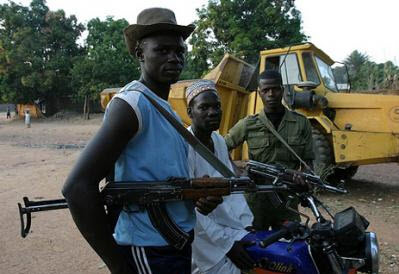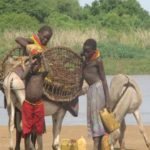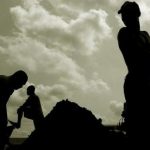As Séléka rebels clash with anti-balaka forces and the dire humanitarian situation worsens, international intervention may be the only solution.
By Tendai Marima

Huddled in churchyard grounds or scattered across the country’s thick bush and forests, 395,000 civilians are believed to be seeking refuge from the escalating conflict in the Central African Republic (CAR).
The latest fighting is largely between the Séléka rebels – the group that deposed President François Bozizé and replaced him with Michel Djotodia back in March – and forces known as the anti-balaka.
After Séléka’s overthrow of Bozizé earlier this year, the group looted and attacked many communities. Thousands fled their homes and the humanitarian crisis deepened.
At the same time, a motley crew of local self-defence militias and anti-Séléka armed groups – which have come to be known collectively as the anti-balaka – emerged. In retaliation to Séléka’s rampages, these local vigilante peasants – armed with machetes, rifles and other weapons – waged an armed resistance in the north.
This has only led CAR’s insecurity to escalate and the humanitarian situation in the country to worsen. Meanwhile the transitional government in Bangui continues to seem powerless to act.
The anti-balaka vs the Séléka
The name ‘anti-balaka’ – which means anti-sword or anti-machete in the local languages of Mandja and Sango – is often used to describe self-defence units set up by communities to fight against bandits, cattle-raiders, rebels and poachers.
During CAR’s 2004-2007 bush war, for example, the anti-balaka were local vigilante groups who rose up in resistance to the abuses of CAR’s main rebel formation, the Armée Populaire pour la Restauration de la Démocratie (APRD). Militias – including the Union des Forces Démocratiques pour la Rassemblement (UFDR), a collective of dissident groups led by the current transitional president and then rebel leader Michel Djotodia – launched a major offensive in the north, seizing key towns but also committing atrocities including summary executions, abductions and forcible recruitment of child soldiers.
Since the launch of the Séléka’s insurgency in December 2012, the northwest has again been besieged with persistent raids, kidnappings and killings. This has led numerous militias made up of former soldiers, some breakaway Séléka rebels, and certain groups of Christian vigilante farmers to combine their disparate units against a common and largely Muslim enemy. Today’s anti-balaka also includes the Association of Central African Farmers (ACP), an anti-Séléka peasant movement, as well as the Front for the Return to the Constitutional Order in Central Africa (FROCCA). FROCCA is a militia made up of ex-army officers loyal to the former president as well as local vigilantes fed up with the Séléka’s continued violence; the group was formed in Paris this August by Bozizé.
Despite having these Bozizé elements behind it, the scope and size of the anti-balaka movement is still largely regional, and its armed attacks group are not yet fully co-ordinated or capacitated to challenge the Séléka in full-blown combat. The northwest of CAR – the home of Bozizé’s traditional roots and ex-members of the Presidential Guard, the core of Bozizé’s fighting force – remains the hotspot for violence between the anti-balaka and the Séléka, with the most vivid and bloody battles occurring in Bossangoa, Bouca and Bouar where scores have been killed in the violence.
A rocket and rife assault on the market town of Bouar on 26 October, for example, left at least 40 dead. Destitute and fearful, 5,000 refugees crammed into a Catholic Church compound. Although the joint regional peacekeepers – the Central African Multinational Force (FOMAC) and the Central African Armed Forces (FACA) – have regained control of Bouar, simmering tensions on Friday resulted in the Séléka burning two villages nearby, heightening fears of further revenge attacks.
Another factor often cited in the violence is the issue of religion, with the conflict sometimes framed as pitching the largely Muslim Séléka rebels against the predominantly Christian anti-balaka forces. But while religious tension is an important factor in some instances of violence, this framing is simplistic. For instance, along with Muslims from CAR and abroad, the Séléka also includes many non-religious rebels, other bandits and opportunists who have joined in the looting and vandalism since March. And while the rebels have committed some religiously-motivated atrocities against Christians, they are also driven by non-religious motivations and have attacked Muslim communities on occasion.
Intervention needed
As the Séléka has terrorised populations across the north-west and CAR as a whole, the Djotodia-led government in Bangui has lacked the capacity to discipline the former rebels or deploy a sizeable, equipped force to deal with the lawlessness.
The government’s inability to contain the Séléka as well as anti-balaka forces reveals a deep crisis of governance and points to Djotodia’s lack of authority as the president and as the Séléka’s former leader. Djotodia’s attempts to disarm and reintegrate the militants have seen little co-operation from the rebels themselves, with demobilisation operations in Bangui often resulting into flare-ups between rebels or attacks on pro-Bozizé districts. Lacking a clear national plan, disarming and reintegrating a Séléka force of at least 20,000, which includes bandits and foreign mercenaries, has been an almost impossible task for the overwhelmed government. In September, Djotodia officially disbanded the Séléka, but the dissidents did not disarm and dissolve as ordered, but continued to run riot.
Although government officials insist they need military support rather than further foreign intervention, CAR’s small national army is too weak and poorly equipped to fight the Séléka, whose execution of government soldiers in and around Bangui has been well-documented. Historically, CAR has relied on international support through civil wars and coups, and without the support of stronger, better-equipped foreign forces, there is little hope of restoring order.
To help, France plans to increase its troop presence from 400 to 700-750 by year end, but has made clear that it “will not play the world’s police” and that it does not want to get entangled in another military intervention. Instead, the French have increased calls for African states to provide personnel for an African-led mission. In July, the UN approved a force of 3,652 personnel to boost and transform the current regional peacekeepers into the International Support Mission in the Central African Republic (MISCA), but hampered by financial and logistical problems, MISCA is unlikely to be operational before 2014.
But while this international assistance is an encouraging sign, CAR’s crisis could require a more urgent and well-funded intervention and, critically, regional facilitation of talks between all conflicting parties. Almost half a million people have been made homeless by the fighting in CAR, UN officials warn of the risk of genocide and anarchy if the conflict continues, and CAR’s transitional government seems unable to protect its own people. As one of the planet’s poorest and most fragile states teeters on the brink of war, it’s critical the world responds faster and more robustly to the crisis faced by 4.5 million Central Africans.

